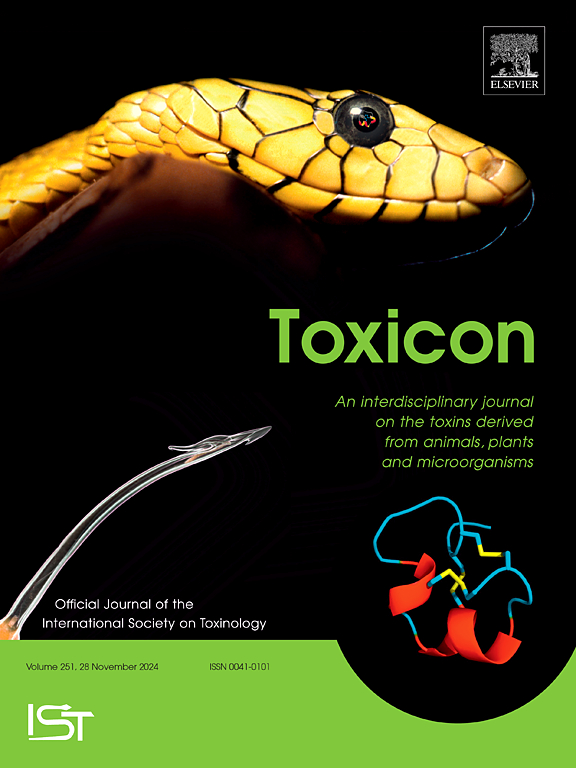New proposal for the systematic nomenclature of scorpion peptides
IF 2.6
4区 医学
Q2 PHARMACOLOGY & PHARMACY
引用次数: 0
Abstract
The systematic annotation of novel peptides found in the venom of scorpions needs revision. The commonly used two-letter acronym with the initials of the genus and the species is not discriminative and induces confusion. A new universal five-letter abbreviated code is here proposed. With this code, every species can be unambiguously identified. The code contains the initial capital letter of the genus, followed by four letters from the species. This code discriminates the large majority of the species. For the few others from the same genus and with coinciding initial letters of the species name, a change in the fifth letter ensures uniqueness. For scorpions belonging to different genera with identical initial letters and the same exact species name, a five-letter identifier can be generated by using two letters from the genus (in uppercase) and three letters from the species (in lowercase). Following this proposal, the peptides belonging to all scorpion species can be properly annotated.

蝎肽系统命名的新建议。
在蝎子毒液中发现的新多肽的系统注释需要修订。通常使用的属和种的首字母缩写的两个字母是没有区别的,引起混淆。这里提出了一种新的通用的五字母缩写代码。有了这个代码,每个物种都可以被明确地识别出来。代码包含属的首个大写字母,后跟来自种的四个字母。这个密码能区分绝大多数物种。对于来自同一属的少数其他物种,并且物种名称的首字母一致,第五个字母的变化确保了独特性。对于不同属的蝎子,如果它们的首字母相同,而且种名也完全相同,那么用属的两个字母(大写)和种的三个字母(小写)就可以生成一个五个字母的标识符。根据这一建议,属于所有蝎子物种的肽都可以适当地注释。
本文章由计算机程序翻译,如有差异,请以英文原文为准。
求助全文
约1分钟内获得全文
求助全文
来源期刊

Toxicon
医学-毒理学
CiteScore
4.80
自引率
10.70%
发文量
358
审稿时长
68 days
期刊介绍:
Toxicon has an open access mirror Toxicon: X, sharing the same aims and scope, editorial team, submission system and rigorous peer review. An introductory offer Toxicon: X - full waiver of the Open Access fee.
Toxicon''s "aims and scope" are to publish:
-articles containing the results of original research on problems related to toxins derived from animals, plants and microorganisms
-papers on novel findings related to the chemical, pharmacological, toxicological, and immunological properties of natural toxins
-molecular biological studies of toxins and other genes from poisonous and venomous organisms that advance understanding of the role or function of toxins
-clinical observations on poisoning and envenoming where a new therapeutic principle has been proposed or a decidedly superior clinical result has been obtained.
-material on the use of toxins as tools in studying biological processes and material on subjects related to venom and antivenom problems.
-articles on the translational application of toxins, for example as drugs and insecticides
-epidemiological studies on envenoming or poisoning, so long as they highlight a previously unrecognised medical problem or provide insight into the prevention or medical treatment of envenoming or poisoning. Retrospective surveys of hospital records, especially those lacking species identification, will not be considered for publication. Properly designed prospective community-based surveys are strongly encouraged.
-articles describing well-known activities of venoms, such as antibacterial, anticancer, and analgesic activities of arachnid venoms, without any attempt to define the mechanism of action or purify the active component, will not be considered for publication in Toxicon.
-review articles on problems related to toxinology.
To encourage the exchange of ideas, sections of the journal may be devoted to Short Communications, Letters to the Editor and activities of the affiliated societies.
 求助内容:
求助内容: 应助结果提醒方式:
应助结果提醒方式:


